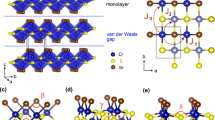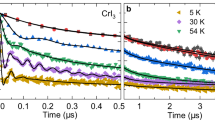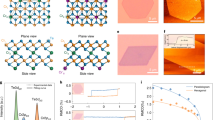Abstract
IT has been pointed out1 that there is a correlation between magnetic and structure transition temperatures for certain antiferromagnetic materials. In the case of Cr2O3, with a Curie temperature of approximately 314° K., it was reported that the 42̄2 reflexion was resolved into a doublet below the Curie temperature. This communication presents additional information concerning the nature of the structure change responsible for the doublet formation mentioned above.
This is a preview of subscription content, access via your institution
Access options
Subscribe to this journal
Receive 51 print issues and online access
$199.00 per year
only $3.90 per issue
Buy this article
- Purchase on Springer Link
- Instant access to full article PDF
Prices may be subject to local taxes which are calculated during checkout
Similar content being viewed by others
References
Greenwald, S., and Smart, J. S., Nature, 166, 523 (1950)
Néel, L., Ann. de Phys., 3, 137 (1948).
Smart, J. S., and Greenwald, S., [Phys. Rev., 82, 113 (1951).]
Author information
Authors and Affiliations
Rights and permissions
About this article
Cite this article
GREENWALD, S. Changes in Lattice Constants of Cr2O3 near the Curie Temperature. Nature 168, 379 (1951). https://doi.org/10.1038/168379a0
Published:
Issue Date:
DOI: https://doi.org/10.1038/168379a0
This article is cited by
-
Influence of Pre-oxidation on Filamentary Carbon Deposition on 20Cr25Ni Stainless Steel
Oxidation of Metals (2019)
-
Observations on the Decay of Heavy Mesons in Photographic Emulsions
Resonance (2019)
-
Changes in Lattice Constant of Cr2O3 near the Curie Temperature
Nature (1956)
Comments
By submitting a comment you agree to abide by our Terms and Community Guidelines. If you find something abusive or that does not comply with our terms or guidelines please flag it as inappropriate.



